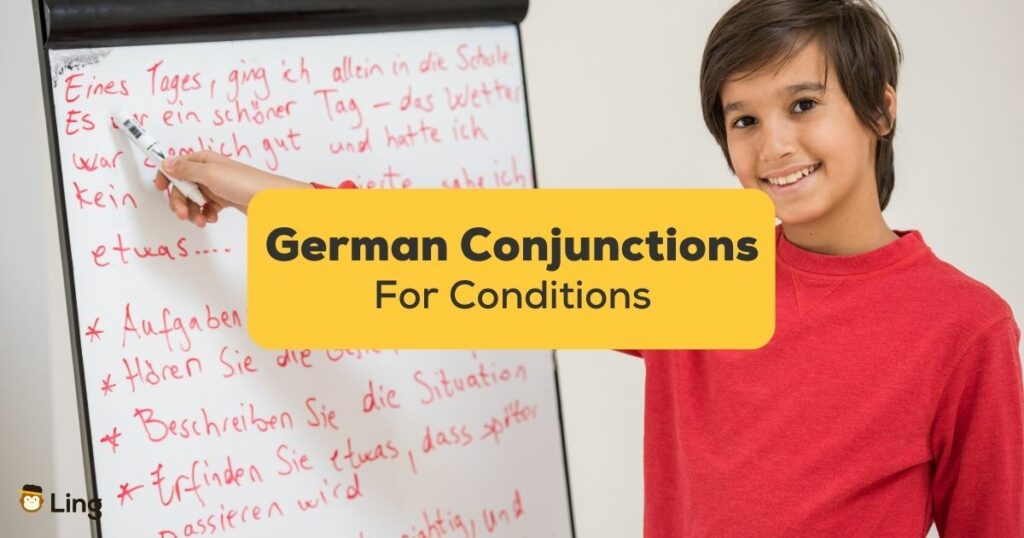Are you finding yourself stumbling over sentences that involve German conjunctions for conditions? Are you unsure about when to use “wenn,” “falls,” or “sofern”? Don’t worry because you’re not alone! By the end of this insightful guide, not only will you understand what these “Konjunktionen“ mean, but you’ll also know exactly how to use them correctly. Let’s begin!
Imagine you’re an architect, and you’re creating the blueprint for a grand and complex building. You design rooms (words) and hallways (phrases), but how do you ensure that all these individual elements connect to form a seamless, logical structure?
That’s where conjunctions step in!
In the architectural marvel that is language, conjunctions play an unsung yet pivotal role. Think of them as corridors, staircases, and elevators connecting different parts of your linguistic building. Without them, each room would stand alone, resulting in a disarray of disjointed spaces. The building, much like a sentence without conjunctions, would lose its coherence. The flow of movement, or in the case of language, the flow of thought and conversation, would come to a standstill.
What Are Conjunctions?
Conjunctions, in the simplest of terms, are like the joints in the body of language. They might not be the most glamorous parts, but without them, communication would be a challenging task, like a body trying to move without joints.
At their essence, conjunctions are the connectors, the uniters, the bridge builders of language. They are indispensable words that allow us to establish a relationship between words, phrases, or clauses, providing a seamless transition that gives sentences a logical flow and cohesive structure. In a sentence, conjunctions can serve various functions, depending on what we want to express. They can show addition (and), contrast (but), choice (or), cause and effect (so, because), and even condition (if). For example, in the sentence “I enjoy reading books and watching movies,” the conjunction “and” connects two activities that the speaker enjoys.
Now, in German, conjunctions are not a one-size-fits-all. They come in different types and serve different purposes, helping us to navigate the landscape of this language with more ease and fluency. But of course, we do not want to overwhelm you with so much information! In this article, we’ll only focus on the three most common conjunctions used for expressing conditions.

German Conjunctions For Conditions
In the German language, conditional conjunctions are a specific type of subordinating conjunctions. They’re the ones bringing the “ifs” and “buts” into the equation, introducing a condition that the main clause hinges on. Ready to learn? If yes, then let’s meet the most common German condition conjunctions: “wenn,” “falls,” and “sofern.”
Usage Of “Wenn”
Meet “wenn,” the workhorse of German condition conjunctions. “Wenn” is typically translated as “if” or “when” in English and is used in several contexts, creating a canvas of possibilities for both real and hypothetical conditions. It’s like the Swiss army knife of condition conjunctions—versatile, reliable, and always ready for action.
Consider these examples:
- “Wenn es regnet, nehme ich einen Regenschirm.” (If it rains, I take an umbrella.) In this sentence, “wenn” is used to indicate a real condition; when it rains, the action of taking an umbrella will occur.
- “Wenn ich reich wäre, würde ich ein Haus kaufen.” (If I were rich, I would buy a house.) Here, “wenn” introduces a hypothetical condition. It’s uncertain whether the speaker will become rich, but if that were to happen, they would buy a house.
- “Ich gehe ins Kino, wenn ich Zeit habe.” (I go to the cinema when I have time.) “Wenn” is also used here to express a repeated or general condition – whenever the speaker has time, they go to the cinema.
Usage Of “Falls”
Next on our list is “falls,” a somewhat more elusive character. Translating to “in case” or “if” in English, “falls” is used to express a possible or uncertain condition. Think of “falls” as the cautious friend who always considers contingencies and prepares for various outcomes.
Let’s look at some examples:
- “Falls es regnet, bleiben wir zu Hause.” (In case it rains, we stay at home.) This sentence expresses a potential situation. If it happens to rain, the decision is to stay at home.
- “Falls du Hilfe brauchst, ruf mich an.” (If you need help, call me.) Again, “falls” introduces an uncertain condition, conveying the message that if help is needed, a call should be made.
- “Sie wird teilnehmen, falls sie Zeit hat.” (She will participate if she has time.) The condition of having time is uncertain, and if met, she will participate.
Usage Of “Sofern”
Finally, we come to “sofern.” While not as commonly used as “wenn” or “falls,” “sofern” holds its own by expressing preconditions. It’s equivalent to saying “provided that” or “as long as” in English. Imagine “sofern” as the gatekeeper; the main clause can only come to fruition if the condition set by “sofern” is met.
Here are some examples to illustrate this:
- “Sofern das Wetter gut ist, gehen wir wandern.” (Provided that the weather is good, we go hiking.) Here, “sofern” sets a precondition – the hiking only happens if the weather is good.
- “Sie kann kommen, sofern sie möchte.” (She can come as long as she wants to.) The invitation is open, but it’s conditional on her desire to attend.
- “Wir können spielen, sofern wir einen Ball haben.” (We can play, provided we have a ball.) The precondition here is the possession of a ball. If that condition is met, then the game is on.
As you can see, conjunctions might seem small, but they pack quite a punch. They’re an integral part of speaking German naturally and fluently. By understanding and using conditional conjunctions like “wenn,” “falls,” and “sofern” correctly, you’ll be boosting your German skills significantly. So don’t forget to practice because, remember, Übung macht den Meister – practice makes perfect!
And speaking of practice, would you like to learn more about the German language? If yes, then now is the best time to try out the Ling app!

Learn German With Ling
In the pursuit of mastering a new language like German, having the right tools and resources at your disposal can make all the difference. This is where Ling comes in!
Ling is a dynamic language learning platform that caters to your unique learning style, providing an engaging, interactive, and comprehensive approach to language acquisition. From grammar and vocabulary to listening and speaking exercises, Ling offers a wide range of materials designed to immerse you in the language in a fun and effective way.
What sets Ling apart is its ability to transform learning from a chore into an enjoyable experience. It’s like having a personal language tutor in your pocket, providing feedback, encouragement, and challenging material to ensure you’re always progressing.
If you’re truly dedicated to leveling up your German skills, especially in mastering tricky concepts like conjunctions, Ling could be your best bet. Ready to take the plunge? You’ve got nothing to lose and a wealth of language skills to gain! Download it now from the App Store or Play Store now to get started!






























































